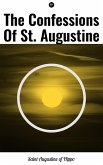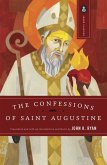More than an autobiography, The Confessions of St. Augustine is one of the most influential religious books in the Christian tradition. A great work of Western literature, it recalls crucial events and episodes in the author's life, in particular, life with his devoutly Christian mother and his origins in rural Algeria in the mid-fourth century A.D.; the rise to a lavish life at the imperial court in Milan; his struggle with sexual desires; eventual renunciation of secular ambitions and marriage; and recovery of his Catholic faith. This intensely personal narrative -- among the first in which self-analysis was used to describe spiritual and emotional experiences -- provides a detailed, classic recounting of one man's internal struggles and religious conversion. The book will be useful to anyone interested in the impact made by one of the foremost leaders in the development of Christian thought. In his Confessions, Saint Augustine reflects upon his life in the light of scripture and the presence of God. He begins with his infancy, pondering the many sins of his life before his conversion, and he confesses not only his sins but even more the greatness of God. This work presents a wonderful contrast between the Holy God who created all things and whom heaven and earth cannot contain, and a commonly sinful man who has joyfully received God's loving salvation and mercy. Many scholars consider Saint Augustine to be among the greatest and most influential fathers of the early church. And as you read his Confessions, you will find the confident humility that is common among those whom Jesus calls "great in the kingdom of heaven." Augustine writes as a common man, and so his words span time and tradition. May his Confessions guide you to the One whom he confesses.
Dieser Download kann aus rechtlichen Gründen nur mit Rechnungsadresse in A, B, BG, CY, CZ, D, DK, EW, E, FIN, F, GR, H, IRL, I, LT, L, LR, M, NL, PL, P, R, S, SLO, SK ausgeliefert werden.









